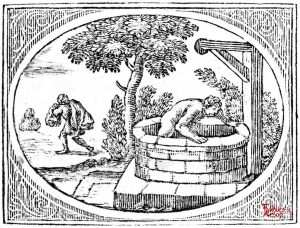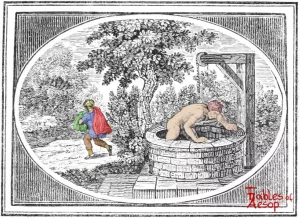A Thief met a boy by a well who said he lost silver down the well. The Thief undressed and jumped into the well to steal it. Done; boy and clothes gone.
Every tale is not to be believed.
[Note: This fable is similar in nature to The Thief and The Innkeeper but not close enough to be put on the same page.]

JBR Collection
A Boy sat weeping upon the side of a well. A Thief happening to come by just at the same time, asked him why he wept. The Boy, sighing and sobbing, showed a bit of cord, and said that a silver tankard had come off from it, and was now at the bottom of the well. The Thief pulled off his clothes and went down into the well, meaning to keep the tankard for himself. Having groped about for some time without finding it, he came up again, and found not only the Boy gone, but his 0wn clothes also, the dissembling rogue having made off with them.

Samuel Croxall
A BOY sat weeping upon the side of a well. A Thief happening to come by just at the same time, asked him why he wept. The Boy, sighing and sobbing, replied, the string was broke, and a silver tankard was fallen to the bottom of the well. Upon this the Thief pulled off his clothes, and went down into the well to look for it; where, having groped about a good while to no purpose, he came up again, but found neither his clothes nor the Boy; that little arch dissembler having run away with them.
THE APPLICATION
However justice may be but little practised and pursued by particular men in the common course of their actions, yet every one readily agrees, that it ought to be kept up and inforced by the several penal laws, in respect to the public in general. Many a one can scarce forbear robbing and defrauding another, when it is in his power to do it with impunity; but at the same time, he dreads being robbed and defrauded again, as much as if he were the most innocent man living, and is as severe in prosecuting the offenders; which proves, that an unjust man is deliberately wicked, and abhors the crime in another which he dares commit himself. It is for this reason, that the greater part of mankind like well enough to have punishment inflicted upon those who do wrong; accordingly submit themselves to be governed peaceably and quietly by the laws of their country, upon the prospect of seeing justice executed upon all those who do them an injury. And, however a tender nature may shrink at the sight, and commiserate the condition of a suffering malefactor, yet, in the main we may observe, that people are pleased and satisfied when the sword of justice is unsheathed; and multitudes will even crowd to be spectators, when the finishing stroke is given. But what affords us the greatest pleasure upon such occasions, is, when we are entertained with a view of justice, acting, as it were, in person, and punishing cheats and tricksters, by making their own contrivances instrumental in it, and by ordering, as in the fable, that their wickedness may fall upon their own head.

Thomas Bewick (The Thief and The Boy)
An arch mischievous Boy, sitting by the side of a well, observed a noted Thief coming towards him. The little dissembler, wiping his eyes, affected to be in great distress. The Thief asking him what was the matter? ah! says the Boy, I shall be severely flogged, for in attempting to get some water, I have dropped the silver tankard into the well. Upon this the Thief, eager for a prize, stripped off his cloaths, and went down to the bottom to search for it; where having groped about to no purpose, he came up again, but found neither the Boy nor the cloaths, the little wag having run off with and hidden them, and left the Thief to look for the tankard at his leisure.
APPLICATION.
Nothing gives more entertainment to honest men, than to see rogues and sharpers tricked and punished in the pursuit of their schemes of villainy, by making their own contrivances instrumental in bringing down their wickedness upon their own heads. In these instances, Justice seems as it were to be acting in person, and saves the trouble of publicly enforcing punishment by the penal laws; but indeed vice carries with it its own punishment, and the misery attendant upon it in this world, seems always pretty exactly balanced to its various degrees of enormity. The abandoned man drags on a contemptible or infamous life, with a constantly deadened or disturbed conscience, and amidst associates like himself, where he can never hope to meet with either friendship or fidelity.

Fur et Puer
Puer sedebat, flens, apud puteum. Fur causam flendi rogat; puer dicit, fune rupto, urnam auri incidisse in aquas. Homo se exuit, insilit in puteum, quaerit. Vase non invento, conscendit atque ibi nec invenit puerum, nec suam tunicam, quippe puer, tunica sublata, fugerat.
Moral
Interdum falluntur, qui solent fallere.
Perry #581


